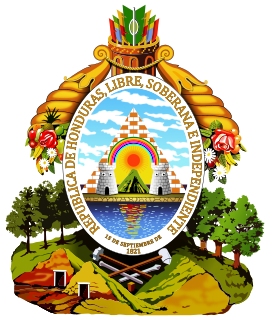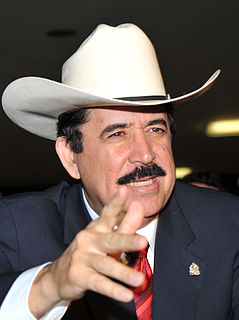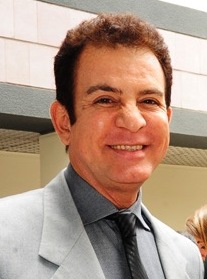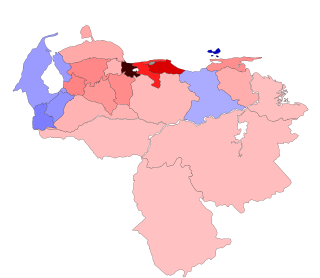Honduran general election, 2017
|
|
| Registered | 6,046,873 |
|---|
| Turnout | 3,476,419 (57.49%) |
|---|
|
|
General elections were held in Honduras on 26 November 2017. Voters went to the polls to elect the President of Honduras to serve a four-year term, as well as 128 members of the unicameral National Congress, 20 members for the Central American Parliament and mayors for the municipalities of Honduras.

Honduras, officially the Republic of Honduras, is a country in Central America. In the past, it was sometimes referred to as "Spanish Honduras" to differentiate it from British Honduras, which later became modern-day Belize. The republic of Honduras is bordered to the west by Guatemala, to the southwest by El Salvador, to the southeast by Nicaragua, to the south by the Pacific Ocean at the Gulf of Fonseca, and to the north by the Gulf of Honduras, a large inlet of the Caribbean Sea.

The President of Honduras officially known as the President of the Republic of Honduras, is the head of state and head of government of Honduras, and the Commander-in-chief of the Armed Forces. According to the 1982 Constitution of Honduras, the Government of Honduras consists of three branches: Executive, Legislative and Judicial. The President is the head of the Executive branch, their primary duty being to "Execute and enforce the Constitution, treaties and conventions, laws and other legal dispositions." The President is directly elected for a four year term.

The National Congress is the legislative branch of the government of Honduras.
The election was the first after the constitution of Honduras was amended to allow for a president to seek re-election, [2] a controversial development since the mere possibility of changing the constitution to allow for re-election was a primary justification for the 2009 Honduran coup d'état. The sitting president, Juan Orlando Hernández had been the favorite going into the election, but early results showed a significant advantage for his major challenger, Salvador Nasralla. As the Supreme Electoral Tribunal (TSE) slowly announced the vote totals, Hernández gained in the vote counts amid numerous irregularities, leading to cries of electoral fraud and protests across the country. [3] The protests escalated over the next several days as the country awaited final results, and on 1 December, Juan Orlando Hernández's government issued a ten-day curfew to try to control the protests. [4]

The Political Constitution of the Republic of Honduras was approved on 11 January 1982, published on 20 January 1982, amended by the National Congress of Honduras 26 times from 1984 to 2005, and 10 interpretations by Congress were made from 1982 to 2005. It is Honduras' twelfth constitution since independence in 1838. Previous charters were adopted in 1839, 1848, 1865, 1873, 1880, 1894, 1906, 1924, 1936, 1957 and 1965.

The 2009 Honduran coup d'état, part of the 2009 Honduran constitutional crisis, occurred when the Honduran Army on June 28, 2009 followed orders from the Honduran Supreme Court to oust President Manuel Zelaya and send him into exile. Zelaya had attempted to schedule a non-binding poll on holding a referendum on convening a constituent assembly to rewrite the constitution. Zelaya refused to comply with court orders to cease, and the Honduran Supreme Court issued a secret warrant for his arrest dated 26 June. Two days later, Honduran soldiers stormed the president's house in the middle of the night and detained him, forestalling the poll. Instead of bringing him to trial, the army put him on a military aeroplane and flew him to Costa Rica. Later that day, after the reading of a resignation letter of disputed authenticity, the Honduran Congress voted to remove Zelaya from office, and appointed Speaker of Congress Roberto Micheletti, his constitutional successor, to replace him.

Juan Orlando Hernández Alvarado, often known as JOH, is the fifty-fifth and current president of Honduras, who assumed office on January 27, 2014, after winning the 2013 Honduran general election. He began his second presidential term on January 27, 2018.
Following the election, both candidates claimed victory. [5] On 17 December, twenty-one days after the election, Hernández was declared the winner by the TSE, which is dominated by Hernández loyalists. [1] [6] The Organization of American States (OAS), which conducted independent monitoring of the election, found widespread irregularities in the conduct of the voting and doubted the validity of the official results. The OAS called for a new election. [6]

The Organization of American States, or the OAS or OEA, is a continental organization that was founded on 30 April 1948, for the purposes of regional solidarity and cooperation among its member states. Headquartered in the United States capital Washington, D.C., the OAS's members are the 35 independent states of the Americas.
Presidential candidates
Juan Orlando Hernández of the National Party, who has held office since winning the 2013 election, is the first president in Honduran history running for a second term [9] since the constitution established in 1982, despite the fact that, Article 374 of the constitution of Honduras prohibits both presidential reelection and the altering of the article prohibiting reelection. [10] Manuel Zelaya was ousted by a coup in 2009 for trying to alter this article.

The National Party of Honduras is a political party in Honduras founded on February 27, 1902, by Manuel Bonilla Chirinos. Historically it has been one of the two most influential parties in the country. The party's platform is based on Christian humanist doctrine, and its five main principles are common wealth, dignity of the human person, equality, solidarity and subsidiarity.

José Manuel Zelaya Rosales is a Honduran politician who was President of Honduras from 27 January 2006 until 28 June 2009. He is the eldest son of a wealthy businessman, and inherited his father's nickname "Mel". Before entering politics he was involved in his family's logging and timber businesses.
The left-wing Libre and PINU parties formed the Opposition Alliance against Dictatorship for this election, nominating PAC founder Salvador Nasralla as its candidate. [11] Former Honduran president Manuel Zelaya, who was forced out of office in the coup in 2009, supported Nasralla and acted as a political strategist for the Opposition Alliance's campaign. [12]

Liberty and Refoundation is a leftist political party in Honduras. Libre was founded in 2011 by the National Popular Resistance Front (FNRP), a leftist coalition of organizations opposed to the 2009 coup.

Innovation and Unity Party is a centre-left political party in Honduras, established in 1970. PINU was created by Miguel Andonie Fernández as a democratic, moderate left-wing alternative to the two major parties and the military régime.

Salvador Alejandro César Nasralla Salum is a Honduran sports journalist, television presenter, master of ceremonies, businessman, and politician. He is the presenter of the TV programs 5 Deportivo and X-0 da Dinero, and has been called "El señor de la televisión". He was the founder of the Anti-Corruption Party in 2011 when he stood for President in the Honduran general election, 2013. He stood again in the Honduran general election, 2017 for the political alliance Alianza de Oposición contra la Dictadura, made up of Liberty and Refoundation and the Innovation and Unity Party. He lost the election, but the Organization of American States called for a new vote amidst widespread irregularities.
The center-right Liberal Party nominated former president of the Central American Technological University Luis Orlando Zelaya as its candidate. [13]
Results and aftermath
The polls closed at 16:00 local time (UTC-5) on election day, a change from years past when polls had closed at 17:00. [19] Supporters of the opposition saw this as an attempt by the TSE, which is effectively controlled by Hernández's National Party, to suppress the vote. [19] After voting, the TSE planned to begin releasing vote totals as they came out, but suspended the process for close to seven hours. [19] Before any official results had been announced, Hernández declared himself the victor, and Nasralla followed by also claiming victory. [19] The following day, the TSE released its first preliminary results: with 57% of the votes counted, Nasralla held a 5 point advantage over Hernández, with 45.17% to Hernández's 40.21%. [20]
The TSE then halted the count for 36 hours [21] and announced that final results may not become available until Thursday, 30 November. [19] Over the course of the week, the TSE released updated vote totals, which saw Nasralla's lead steadily erode and Hernández pull ahead in the vote count. [21] After the TSE again paused in its vote totals for several hours, claiming to have experienced a glitch in the computer system, [21] Nasralla denounced the TSE for fraud, declared he would not recognize the results, and urged his supporters to take to the streets, which they did across the country. [22] According to an analysis done by Georgetown University professor Irfan Nooruddin for the Organization of American States, there was a sudden swing in the vote totals after 68 percent of the votes were counted. [6] Nooruddin concluded that the "differences are too large to be generated by chance and are not easily explicable, raising doubts as to the veracity of the overall result." [23]
On 30 November, with approximately 94% of the votes counted, Hernández's lead had climbed to 42.92% compared to 41.42% for Nasralla. [22] On 1 December, the TSE announced that they would give no further results until the TSE had been able to review all of the 1,031 tally sheets which had not been properly filled out by the political parties. [22] [24] The 1,031 tally sheets represent 5.69% of the total vote. [24] Later that same day, as the TSE was still trying to convoke 60 representatives and four supervisors for both Nasralla and Hernández for the final vote count, [25] Hernández's cabinet announced a ten-day curfew from 6pm to 6am to try to calm the violence associated with the protests. [4]
On 2 December, the Honduran National Roundtable for Human Rights issued a press release, in which it declared that the government actions were state terrorism against civilians, it warned that the declaration of a state of exception was in order to create repression to ensure electoral fraud labeling it as illegal after reading several articles of the Honduran constitution. [26]
As of 2 December, at least 7 people had died in the protests with more than 20 injured. [27] On the second night of the curfew, thousands of people participated in what is known as " cacerolazos ", banging pots and pans in protest. [28] [29]
As of 15 December, 2017, the court had finished a recount of ballot boxes that presented irregularities but had still not declared a winner, and protests continued throughout the country, with 16 deaths and 1,675 arrests, according to Honduras' National Human Rights' Commission. [30] The court has 30 days from the contest to do so. [30]
The TSE finally announced a winner on 17 December, giving Hernández the victory with 42.95% of the vote to Nasralla's 41.42%. [31] The announcement sparked a new wave of protests across the country, with Mel Zelaya announcing a national strike. [31] The country's two major cities - Tegucigalpa and San Pedro Sula - saw streets blockaded, their main exits blocked, and traffic between them severely reduced. [31] [32]
Organization of American States (OAS) election monitors, in their final report, documented widespread and numerous irregularities in the conduct of the voting and ballot tabulation, and doubted the validity of the official results. OAS secretary general Luis Almagro issued a statement following the TSE's announcement saying: "Facing the impossibility of determining a winner, the only way possible so that the people of Honduras are the victors is a new call for general elections." Hernández rejected the OAS's position, and his top aide accused of OAS of seeking "to try and steal the election" for Nasralla. [6]
The Economist analyzed the vote tallies as reported by the TSE and compared that information with census data to analyze the validity of Hernández's explanation for the sudden swing in the vote tallies: that the later votes came from areas with more National Party support. [33] However, The Economist found that explanation implausible, noting that the swing happened in municipalities, which tend to be small and urban, across the country. [33] The only other explanation for the swing in the vote tally would be that paper ballots favored Hernández by 18 percentage points where electronic ballots favored Nasralla by 5 percentage points, but, as The Economist noted, the "odds are that that didn’t happen". [33]
President
| Popular vote |
|---|
| | | | |
| National | | 42.95% |
| LIBRE | | 41.42% |
| Liberal | | 14.74% |
| Patriotic Alliance | | 0.20% |
| Anti-Corruption | | 0.18% |
| Christ. Democrat. | | 0.18% |
| Dem. Unification | | 0.14% |
| Broad Front | | 0.10% |
| Go-Solidarity | | 0.09% |
| Candidate | Party | Votes | % |
|---|
| Juan Orlando Hernández | National Party of Honduras | 1,410,888 | 42.95 |
| Salvador Nasralla | Liberty and Refoundation–PINU-SD | 1,360,442 | 41.42 |
| Luis Orlando Zelaya | Liberal Party of Honduras | 484,187 | 14.74 |
| Romeo Vásquez Velásquez | Honduran Patriotic Alliance | 6,517 | 0.20 |
| Marlene Elizabeth Alvarenga | Anti-Corruption Party | 5,983 | 0.18 |
| Lucas Evangelisto Aguilera | Christian Democratic Party | 5,900 | 0.18 |
| Alfonso Díaz Narváez | Democratic Unification Party | 4,633 | 0.14 |
| Isaías Fonseca Aguilar | Broad Front | 3,151 | 0.10 |
| Eliseo Vallecillo Reyes | Go-Solidary Movement | 3,003 | 0.09 |
| Invalid/blank votes | 191,715 | – |
| Total | 3,476,419 | 100 |
| Registered voters/turnout | 6,046,873 | 57.49 |
| Source: TSE |




















